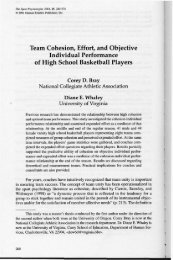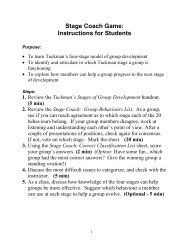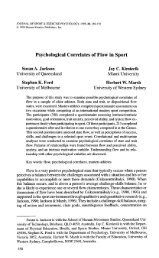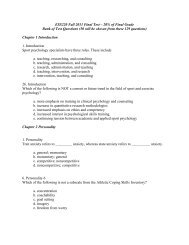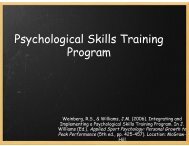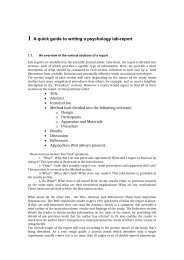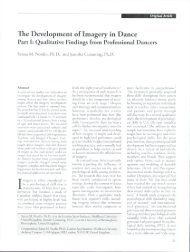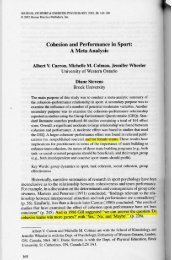Sport and Exercise Psychology Review - Sport Psychology Goes to ...
Sport and Exercise Psychology Review - Sport Psychology Goes to ...
Sport and Exercise Psychology Review - Sport Psychology Goes to ...
You also want an ePaper? Increase the reach of your titles
YUMPU automatically turns print PDFs into web optimized ePapers that Google loves.
Conference Report<br />
The British Psychological Society<br />
Quinquennial Conference, Manchester,<br />
March 30 – April 2, 2005<br />
Paul Russell<br />
THE BRITISH Psychological Society<br />
hosted its Quinquennial Conference<br />
during the Easter period at the University<br />
of Manchester. Over 20 subsystems were<br />
represented, resulting in one of the largest<br />
ever psychology events in the United<br />
Kingdom. Overall, there were 15 streams of<br />
symposia, free communications, posters,<br />
workshops <strong>and</strong> a large exhibition area. A<br />
pre-conference workshop hosted by the<br />
Division of <strong>Sport</strong> <strong>and</strong> <strong>Exercise</strong> <strong>Psychology</strong><br />
(DSEP) entitled, ‘Experiences from the<br />
Athens Olympics’ looked an exciting <strong>and</strong><br />
positive way <strong>to</strong> start the conference. The<br />
workshop, organised by Dr. Ailsa Anderson<br />
<strong>and</strong> Sarah Cecil, drew on the reflections of<br />
four sport psychologists who provided<br />
support <strong>to</strong> the Great Britain Olympic <strong>and</strong><br />
Paralympic teams during the summer 2004<br />
event. The workshop was well-attended, with<br />
approximately forty delegates enjoying a<br />
thoroughly stimulating <strong>and</strong> thought-provoking<br />
day. It was also good <strong>to</strong> see that the workshop<br />
delegates were drawn from a range of<br />
both academic <strong>and</strong> applied backgrounds;<br />
this was reflected in the range of insightful<br />
questions that the audience asked of the presenters<br />
throughout.<br />
Although each presenter attended the<br />
Olympic/Paralympic Games, this is where a<br />
large degree of similarity ended. Their perspectives<br />
<strong>and</strong> individual thoughts about the<br />
wide diversity of experiences they reported<br />
highlighted how unique this environment is.<br />
The first presenter, Professor Ian Maynard,<br />
reflected on his experiences in providing<br />
psychological support <strong>to</strong> the Royal Yachting<br />
Association. The presentation revealed the<br />
extensive psychological <strong>and</strong> organisational<br />
preparation that is required pre-travelling <strong>to</strong><br />
allow the athletes the best opportunity <strong>to</strong><br />
achieve. Professor Maynard emphasised the<br />
importance of simulation training <strong>and</strong><br />
preparing the athletes for the unique atmosphere<br />
of the ‘Big Show’. The presentation<br />
also showed how the use of video footage can<br />
be effective in getting key messages across <strong>to</strong><br />
athletes. Short clips from Star Wars <strong>and</strong> Any<br />
Given Sunday certainly conveyed powerful<br />
messages for the athletes.<br />
The second presenter, Dr Jonathan Katz,<br />
was the Headquarters Psychologist at the<br />
Paralympic Games for Team GB. His insightful<br />
account outlined the unique dem<strong>and</strong>s<br />
placed on these athletes in this environment,<br />
<strong>and</strong> how specific considerations have <strong>to</strong> be<br />
made <strong>to</strong> issues like travelling <strong>and</strong> accommodation.<br />
Dr Katz’s evaluation of his experiences<br />
also revealed the inherent problems<br />
that surround accreditation <strong>and</strong> security<br />
at major multi-sport competitions. This was<br />
echoed in the third presentation by<br />
Dr Jonathan Males, who was the British<br />
Headquarters Psychologist at the Athens<br />
Olympic Games. Dr Males was not attached<br />
<strong>to</strong> a particular sport in this role, <strong>and</strong> he<br />
revealed how he was able <strong>to</strong> effectively<br />
deliver psychological support <strong>to</strong> athletes who<br />
he had previously not worked with.<br />
The final presenter, Dr Sheelagh<br />
Rodgers, provided a clinical perspective of<br />
her role at the Olympics. The presentation<br />
58 <strong>Sport</strong> & <strong>Exercise</strong> <strong>Psychology</strong> <strong>Review</strong> Vol 1 No 2




